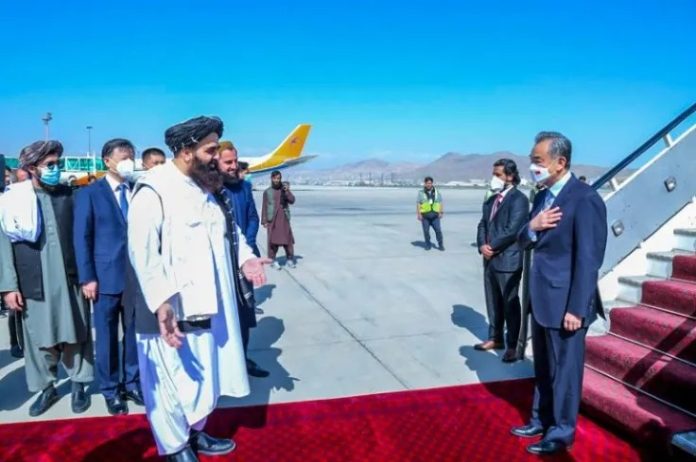China is emerging as a crucial supporter of Taliban-led Afghanistan, with Beijing increasing its footprint in the neighboring country and taking a more proactive tone in its engagement with the regime.
Experts say that China’s reinvigorated policy in post-U.S. Afghanistan could be to “establish an anti-American and anti-West puppet state in Afghanistan.”
In a first for the Taliban since it took control of Afghanistan in August 2021, a representative for the regime participated in this week’s China-hosted Belt and Road Initiative (BRI) forum, the guest list of which included Russian President Vladimir Putin and leaders or representatives from over 130 countries.
Haji Nooruddin Azizi, Taliban’s acting minister for commerce and industry, said Thursday the regime wanted to formally join Chinese President Xi Jinping’s massive BRI infrastructure project. He had also said Wednesday the country was seeking deeper economic cooperation with China.
Over the past two years, China has shown clear signals of its willingness to extend a diplomatic arm to the Taliban and has been nurturing bilateral ties with Kabul.
“Beijing has taken a more proactive approach towards the Taliban-led Afghanistan and also actively sought international support to rebuild Afghanistan, lift sanctions, and unfreeze Afghan foreign assets,” Ayjaz Wani, a fellow in the Strategic Studies Programme at Indian think tank Observer Research Foundation (ORF), told.
“These steps aim to bolster China’s regional influence and counter the United States’ encirclement strategy by expanding its ‘circle of friends,'” he added.
The Taliban has not been recognized by any country so far since it took to power two years back. China, too, has not officially recognized the Taliban as Afghanistan’s government; however, it did become the first country to appoint a new ambassador in Kabul in September. The Chinese embassy had criticized the West at the time and urged other countries to lift sanctions. The Taliban also used the opportunity as an attempt to legitimize their rule and win the support of more countries by throwing a grand ceremony to welcome the new Chinese ambassador.
China has also signed oil and mining deals with the Taliban and included Afghanistan in the China-Pakistan Economic Corridor (CPEC), which is part of the BRI project.
“China has a long-standing relationship with the Taliban predating 2001. With the Taliban’s capture of power in August 2021, Beijing has looked for opportunities to expand its economic, security and strategic interests in the space conceded by the U.S. Afghanistan has rich reserves of mineral resources such as coal, oil, copper, iron, lithium and rare earth minerals, and Chinese companies are looking for opportunities to exploit these,” Shanthie D’Souza, founder and president of Mantraya, an independent research forum, told.
“One of the most significant projects is the construction of a massive copper mine in Mes Aynak, one of the world’s largest copper deposits, which was stuck in limbo in the past decade. China is also investing in iron and gold mining projects, the agricultural sector, as well as in oil and gas exploration,” she added.
Other economic commitments from the Chinese side include China’s Xinjiang Central Asia Petroleum and Gas Co signing an oil extraction with the Taliban in January, said Shivam Shekhawat, Junior Fellow at ORF.
“A recent public ceremony on mining contracts where the group signed deals worth 6.5 billion USD also saw certain Chinese companies,” Shekhawat told.
As part of different “bilateral and multilateral” cooperation frameworks, China has also provided undefined supplies, equipment and technical assistance, noted D’Souza, before adding, “Weapons like Blowfish attack drones may have also been directly delivered to the Taliban.”
In addition to the recent investments and support of different kinds, China’s invitation to Afghanistan for the BRI forum was a clear indication of its effort to normalize cooperation with the Taliban and gain international acceptance for the regime.
At a time when Afghanistan is hungry for investments, Beijing’s willingness to support Kabul could be fueled by its rivalry with the U.S. and with India, which is being viewed by the West as a possible counterbalance to a rising China.
“In the immediate aftermath of a US withdrawal, there were expectations about both China and Russia filling in the vacuum and expanding their influence in the country,” Shekhawat said.
China “aims to gain strategic leverage against the U.S. and India and potential economic benefits … Seeking to fill the vacuum left by the U.S. and NATO, China could be broadly trying to establish an anti-American and anti-West puppet state in Afghanistan through economic instruments like the CPEC and BRI. Not surprisingly, therefore, it has paid only lip service to the raging issues such as minority, girls’ and women’s rights and an inclusive government in Afghanistan,” D’Souza.
Afghanistan also has a role to play in China’s Xinjiang problem. The Xinjiang region in northwest China is home to a Uyghur population — a predominantly Sunni Muslim Turkic ethnic group — of approximately ten million people.
Human rights groups have previously accused China of committing crimes against humanity and possibly genocide against the Uyghur population and other mostly-Muslim ethnic groups in the Xinjiang region. Through increased cooperation with Afghanistan, China can protect its security interests with respect to Uyghur militants.









































